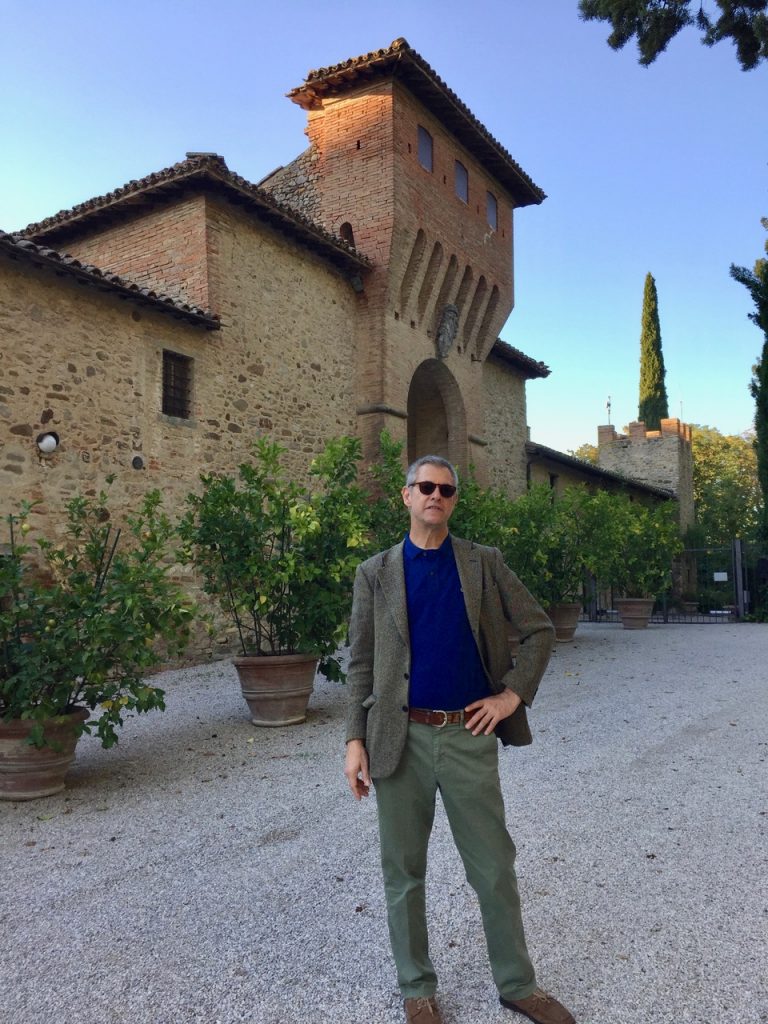 By Francesco Bianchini
By Francesco Bianchini
The world has changed since Françoise, the unflappable cook in Marcel Proust’s Remembrance of Things Past, held sway in his parents’ kitchen. She was entirely devoted to the preparation of meals, which involved daily trips to the market and calls on trustworthy suppliers. One cannot imagine a better connoisseur to judge the quality of a piece of beef or the freshness of asparagus. Advance planning and precise attention were required for all dishes, mundane or special. Françoise and her ilk were proud professionals who knew full well that their standards would be measured against other cooks and even fancy restaurants.

The feast about to begin…
An ideal evocation of that world came to me via a dinner party that Dan and I arranged for friends when autumn began tingeing in yellow and orange the chestnuts and oaks of the valley of the Dordogne. When I called Véronique, chatelaine of the château de Regagnac, for the special favor of booking a dinner for eight, she was out in her woods collecting cèpes – porcini mushrooms – taking advantage of their emergence after the first cloudbursts of the season. Véronique had been our introduction to the rugged beauty of Périgord more than ten years before, when Dan and I alighted at her chambres d’hôte following a perilous drive across the dense forests between the villages of Montferrand and Cadouin. In a land of geese and ducks, looking for Véronique’s castle almost turned into a wild goose chase. At her gates, a most exotic duo – an elderly lady with jet-black hair wearing a coolie hat, and her maid Arlette – showed us to our room. On that first visit to Regagnac, having arrived too late, we gave her table d’hôte a miss. But we caught up years later – by then full-time residents of the region – for a meal that ranks among my most indelible eating experiences, and that made me realize how the prestige of Veronique’s cuisine reposes – with few exceptions – upon whatever her garden and the property supply. Happily, Véronique had just been given a leg of wild boar by men whom she gracefully lets hunt on her land. I assured her that my guests would be delighted to taste the sanglier, and that they would no doubt appreciate her home-made paté. Devotees of modern Roman cuisine, rich in the strong flavor of offal, would have to be similarly persuaded that someone else in the world could possibly enjoy such delicacies.

At the gates of the Château de Regagnac
 The beautiful ochre sandstone of the Périgord
The beautiful ochre sandstone of the Périgord
The night of the dinner, as the final touches were underway in the kitchen – the French coup de feu, that is – we guests dipped delicious crudités in thick home-made mayonnaise and drank champagne in the relaxed atmosphere of Veronique’s salon. Then curiosity prevailed and some of us sneaked into the dining room to snap pictures of the long table set with a red tablecloth, simple and beautifully faded Limoges china, battered silver, and old crystal. Véronique’s late husband had banned electricity from that room: only tall candelabras and the glow of the fire in the huge inglenook provided light for the looming feast. Véronique trotted out of the kitchen and sat at the head of the table, an anxious look etched on her face. A monogrammed plate, out of kilter, caught her attention and caused a hissed rebuke. Arlette, a lopsided lacy cap on her head, and an apron to match covering an incongruously masculine outfit, began serving mushroom soup from a massive silver tureen. Seven kilos of cèpes had ended up in that dense and fragrant potage, we were told. Literary stereotype or not, the first taste should trigger a story dormant in our consciousness. I was thus transported into the dripping woods of my Italian childhood home, La Cervara, the sound of my footsteps muffled by layers of musty-smelling leaves, the air saturated by the decay of sodden branches.

A view from Véronique’s garden
I overheard Arlette whispering to Véronique that the sanglier ‘was thirsty’. Whether good or bad news, our hostess excused herself and went to the kitchen to attend to it. Once back at the table she explained that the gigot – the leg – had been marinating in a broth of garden vegetables for nearly a week, a preparation that required a daily change of liquid. Arlette then served a platter of paté de foie gras studded with caramelized figs, looking like crumpled slices of Christmas pudding, accompanied by chilled Monbazillac, a sort of local Sauternes. Véronique launched into a comparative account of nearby markets and suppliers of fine foie gras, before disclosing her source with the same pride as an Edwardian lady would drop the name of her Bond Street milliner.

Véronique, wearing her trademark coolie hat, welcomes her guests.
Once again Véronique retreated to the kitchen. The sanglier needed her supervision before Arlette could parade it into the room for all of us to marvel. She wobbled around the table showing the whole leg on the platter, and stood briefly grinning in front of the fireplace like an actor at curtain call. The boar was expertly sliced and served, tucked under the silky cover of its light brown gravy. Arlette was sent for the wine, a rare Bordeaux from 2003, the year of the canicule – the summer heat wave that killed over 15,000 people in France. Yet that year proved exceptional for winemaking.
 Service with a certain style
Service with a certain style
Porcini mushrooms reappeared; their large russet caps spread on a silver platter. Sautéed and slow-steamed without butter or garlic, à la Véronique, with just a hint of shallots. Butter and garlic made everything heavier and spoiled the flavor, she insisted. Yet this was what most restaurants did, she lamented, although she went out to eat once in a blue moon. The finale was a chestnut cake, sumptuous as a Sicilian cassata. Véronique turned to me. I made it for you, she said. I can no longer do that. My chestnuts are small, thus infinitely tastier but a pain to shell. Une galère! This will be the last time I make it, she swore. I savored the rich natural texture – almost no sugar, just a dollop of fresh cream – thinking with a pang of nostalgia that I might no longer taste such a miracle. Beauty is a fragile thing. Time, neglect, and ignorance threaten it everywhere. In comparison, ugliness seems invulnerable; still to have good days ahead. One of our American friends asked Véronique if she would allow her to come and watch in the kitchen for a week. A week!, she exclaimed. You must stay with me a year, starting in the spring when I plant my garden! In a nutshell, isn’t that the secret of good cooking?






